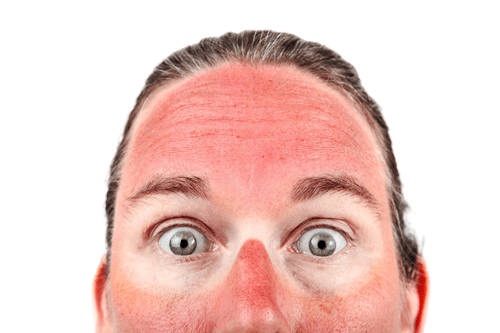It may surprise you to learn your eyes can get sunburned just like your skin. Sunburned eyes are painful, and this condition is called photokeratitis. Too much UV exposure could lead to eye inflammation.
What Causes Sunburned Eyes?
There are a couple of ways you can develop this condition called photokeratitis. Aside from direct subjection to the sun’s rays, you can also get sunburned eyes from sunlight reflecting off water, snow, sand, and even buildings.
The danger of photokeratitis occurs all year, even during cold temperatures. You can even suffer from sunburned eyes on cloudy days.
Many Parts of Your Eyes Can Become Sunburned
There are a few parts of your eyes that can suffer damage because of a sunburn. If your eyes get sunburned, these areas could become affected.
- The cornea is the transparent covering of your eyes.
- The conjunctiva is the mucous membrane that shields your inner eyelids and the white part of your eyes.
- The lens is positioned behind the iris and directs light to the retina.
- The retina is the light-sensitive tissue at the back of the eye.
While most photokeratitis damage is temporary, lasting problems can develop. Some people experience eye disease because of frequent sunburns, including age-related macular degeneration, eyelid skin cancer, and cataracts.
What Are the Symptoms of Photokeratitis?
If your eyes turn red or you experience blurry vision after too much sunlight, you have likely developed photokeratitis. In rare cases, a sunburn can also lead to temporary vision or color loss. Other symptoms may include the following.
- Pain
- Twitching eyelids
- Headache
- Feeling like something is in your eyes
- Excessive watering
- Seeing halos of light around objects
- Sensitivity to light
- Gritty feeling in your eyes
How to Treat Your Sunburned Eyes
In most cases, sunburned eyes will resolve within a few days. You can do a few things to speed up the healing process after too much exposure to UVB rays.
- Get into a dark room as soon as you start experiencing sunburned eyes.
- Wear protective sunglasses whenever you are in the sun to preserve vision health.
- Soothe your eyes with a cool wash cloth and remove contact lenses.
- Take over-the-counter pain medication if you are in pain.
- Use moisturizing eye drops to stop the dryness and gritty feeling.
- Stop swimming immediately in chlorinated water.
What Should You Avoid with Sunburned Eyes?
There are certain things you should avoid when you have photokeratitis.
- Do not scratch or rub your eyes.
- Do not wear contact lenses until your eyes heal.
- Avoid wearing eye makeup or false eyelashes, as this can cause further irritation.
- Do not apply false eyelashes until full healing takes place.
- Do not swim in salt or chlorinated water, and avoid going to beaches with sand.
When Is Photokeratitis More Likely to Occur?
Photokeratitis can occur at any time, but some situations put you at more of a risk. Protect your eyes and vision in the following situations.
Playing Outside in Bright Light
When playing outside, the fun can keep you from thinking about eye protection from UV rays. Concrete surfaces and water can both reflect UV rays and cause sunburn. Make sure everyone in the family wears eye protection like sunglasses around bright light sources and UV rays.
Even if there is enough cloud cover, you could still receive sunburned eyes if you don’t wear sunglasses. For health and vision purposes, always wear sunglasses and do not rub your eyes if they itch, regardless of whether there is enough cloud cover or not.
Tanning Salons
Tanning beds are notorious for causing photokeratitis. Your eyes are still exposed to UV rays in a tanning bed, even though they are not from the sun.
You should also be careful around other light sources besides a tanning bed, including halogen desk lamps, photographic flood lamps, and mercury vapor lamps.
Snowy Days
Snowy days can be misleading because the air is cool, but sunburns can still occur, and your eyes are particularly vulnerable after too much exposure to UV rays. On a snowy day, your eyes are exposed to double the UV rays.
You have UV rays hitting you from the top and bouncing up from the snowy ground. Always wear protective eye gear when playing in the snow.
High Altitudes
You are at an increased risk if you live in or visit a high-altitude area. Hiking and climbing both expose you to greater amounts of UV rays and can result in sunburned eyes and blurry vision.
Photokeratitis Is Preventable
To protect your eyes from sunburn, always wear UV eye protection. Excess exposure to UVB rays may lead to eyelid cancer and damaged vision.
While photokeratitis generally resolves on its own, see your eye doctor if the painful symptoms persist or if you notice symptoms related to eyelid cancer. Your eye doctor can offer recommendations for eye protection or relief for sunburned eyes, such as medicated eye drops.
